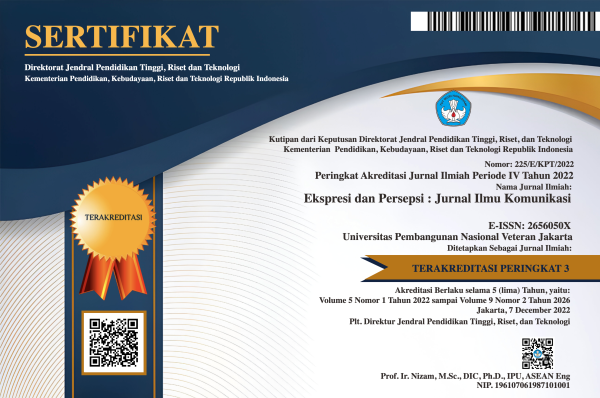Authoritarian Parenting Practices on Korean Drama: Reception Analysis on “SKY Castle”
DOI:
https://doi.org/10.33822/jep.v7i1.6093Keywords:
authoritarian parenting, korean drama, reception analysis, sky castle, stuart hallAbstract
The Korean drama "SKY Castle" received the highest rating of any Korean drama, coming in at 23.78%. The drama "SKY Castle" explores authoritarian parenting and rivalry in South Korean schooling, according to director Jo Hyun Tak. SKY Castle addresses social concerns that are grounded in South Korean reality and bear similarities to social realities in Indonesia. One type of authoritarian parenting that parents in Indonesia engage in is forcing their children to choose their college and university majors. This is because parents have preconceived notions about certain majors and public universities, believing that it will ensure their children's success and financial security. The Stuart Hall reception analysis method is applied in this qualitative study. Interviews and document reviews are the data-collecting methods used in this study. Based on their cultural experiences and backgrounds, the results demonstrate that every informant's viewpoint on authoritarian parenting in the Korean drama "SKY Castle" varies. Mostly because parents of the informants have preconceived notions about certain majors, particularly STEM majors like engineering, medicine, law, and public universities, which can negatively affect both the parent-child bond and the mental health of the child. The informants concurred that SKY Castle depicts parents in an authoritarian manner; nonetheless, majority of them brought up Professor Cha's family, pointing out that other families do not treat their kids harshly. The five informants are, in summary, in a negotiated position.
References
Baumrind, D. (2005). Patterns of Parental Authority and Adolescent Autonomy. Dalam New Directions for Child and Adolescent Development, 108, 61–69.
Byun, E. (2018, November 22). [Full ver] JTBC 새 금토드라마 “SKY캐슬” 제작발표회. 스포츠조선 (Sports Chosun). https://www.youtube.com/watch?v=eKIFmWGZtnI&t=878s
Candelanza, A., Merin, J. A., Candelanza, A. L., Queenilyn, E., Buot, C., & Merin, J. A. (2021). Diana Baumrind’s Parenting Style and Child’s Academic Performance: A Tie-in. Psychology and Education, 58(5), 1497–1502. https://www.researchgate.net/publication/359448493
CNN Indonesia. (2019, September 13). 5 Drama Korea dengan Rating Tertinggi, “Sky Castle.” CNN Indonesia. https://www.cnnindonesia.com/hiburan/20190912151230-220-429996/5-drama-korea-dengan-rating-tertinggi-sky-castle
Creswell, J. W., & Creswell, J. D. (2018). Research Design - Qualitative, Quantitative, and Mixed Methods Approaches (5th ed.). SAGE Publications.
Delvecchio, E., Germani, A., Raspa, V., Lis, A., & Mazzeschi, C. (2020). Parenting styles and child’s well-being: The mediating role of the perceived parental stress. Europe’s Journal of Psychology, 16(3), 514–531. https://doi.org/10.5964/ejop.v16i3.2013
Doepke, M., & Zilibotti, F. (2019). Love, Money & Parenting.
Fathurizki, A., Mei, R., & Malau, U. (2018). Pornografi dalam film: analisis resepsi film “men, women & children.” ProTVF, 2(1), 19–35. https://jurnal.unpad.ac.id/protvf/article/view/11347
Fauzi, Roqib, Moh., Suharto, A. W. B., Kurniawan, H., Novikasari, I., & Kurniawan, F. A. (2021). The Models of Early Childhood Parenting In Families Whose Mothers are Factory Workers in Indonesia. Pegem Journal of Education and Instruction, 11(3), 102–111.
Gafoor, K. A., & Kurukkan, A. (2014). Construction and Validation of Scale of Parenting Style. Guru Journal of Behavioral and Social Sciences, 2(4), 315–323. www.gjbss.org
Hai. (2018, April 19). Cerita Teman-teman Kita yang Salah Jurusan Kuliah. Perlu Dibaca Peserta SBMPTN 2018, Nih! Grid.ID. https://hai.grid.id/read/07601274/cerita-teman-teman-kita-yang-salah-jurusan-kuliah-perlu-dibaca-peserta-sbmptn-2018-nih?page=all
Hall, S. (2001). Encoding Decoding. Dalam The Cultural Studies Reader Second Edition, 507–517.
Hean, F. K. (2019). Intercultural Parenting: How Eastern and Western Parenting Styles Affect Child Development. Routledge.
JTBC Drama. (2019a, January 5). 김병철(Kim Byung-chul), 딸을 믿었던 만큼 배신감 폭발↗ “감히 날 능욕해!” SKY 캐슬(skycastle) 14회. JTBC Drama. https://www.youtube.com/watch?v=1aEL5G0X0Qs
JTBC Drama. (2019b, January 12). [FULL] ♨쫓겨나는 김병철(Kim Byung-chul)님의 최후♨ ↖이건 패륜이야↗SKY 캐슬(skycastle) 16회. JTBC Drama. https://www.youtube.com/watch?v=L_nbcMFcdL4&list=PLHzcbh6XtO3qGUsGKMPBHW5GB5rdgvZfQ&index=3
Laisila, L. (2015, September 2). Dipaksa Kuliah, Mahasiswa Gantung Diri. Suara.Com. https://www.suara.com/news/2015/09/02/183036/dipaksa-kuliah-mahasiswa-gantung-diri
Lee, M. (2018a, November 23). ’SKY 캐슬‘만의 상류층 이야기에 관심 집중되는 이유. 시사위크 (Sisaweek). http://www.sisaweek.com/news/articleView.html?idxno=115828
Lee, M. (2018b, November 30). ’SKY 캐슬‘만의 이야기가 아닌, ’현실‘을 담다. 시사위크 (Sisaweek). http://www.sisaweek.com/news/articleView.html?idxno=116086
Lee, Y. (2019, January 31). ‘SKY 캐슬’에 대한 궁금증 ‘A to Z’···조현탁 감독에게 물었다. 경향신문 (Kyunghyang Shinmun). https://m.khan.co.kr/culture/culture-general/article/201901311651021
Listiani, E., Mulyana, D., Rizal, E., & Mulyana, A. (2019). The Reception Audience of the Woman’s Beauty in Korean Drama. 249–252.
Majid, M. N. (2020). Analisis Resepsi Mahasiswa Terhadap Pemberitaan Hoax di Media Sosial. ETTISAL: Journal of Communication, 5(2), 227–237. https://doi.org/10.21111/ejoc.v5i2.4655
McQuail, D., & Deuze, M. (2020). McQuail’s Media and Mass Communication Theory (Seventh Edition). SAGE Publications Ltd.
Moghaddam, M. F., Validad, A., Rakhshani, T., & Assareh, M. (2017). Child self-esteem and different parenting styles of mothers: A cross-sectional study. Archives of Psychiatry and Psychotherapy, 19(1), 37–42. https://doi.org/10.12740/APP/68160
Muslima, M. (2021). Pengaruh pola asuh orang tua otoriter terhadap motivasi belajar siswa MTSN 4 Banda Aceh. Jurnal MUDARRISUNA: Media Kajian Pendidikan Agama Islam, 11(1), 181–190. https://doi.org/10.22373/jm.v11i1.8680
Ningrum, S. D., & Soeharto, T. N. E. D. (2015). Hubungan pola asuh otoriter orang tua dengan bullying di sekolah pada siswa SMP. Indigenous: Jurnal Ilmiah Psikologi, 13(1), 29–38. https://journals.ums.ac.id/index.php/indigenous/article/view/2318
Odame-Mensah, S., & Gyimah, E. K. (2018). The Role of Permissive and Neglectful Parenting Style in Determining the Academic Performance of Adolescents in the Senior High Schools in the Birim Municipality. Journal of Education and Practice, 9(4), 73–82. www.iiste.org
Onyenankeya, O. M., Onyenankeya, K., & Osunkunle, O. (2020). Contradictions and Tensions Between Old and New: An Audience Perception of Indigenous Culture Representation in Soap Opera. Journal of Asian and African Studies, 1–19. https://doi.org/10.1177/0021909620972444
Sari, M. K., & Abdullah, S. I. (2022). Fenomena pawang hujan (analisis resepsi mahasiswa magister ilmu komunikasi universitas islam bandung terhadap pawang hujan mandalika dalam video berjudul “mendebat si pawang hujan” pada podcast Deddy Corbuzier). Ekspresi Dan Persepsi : Jurnal Ilmu Komunikasi, 5(2), 275–285. https://doi.org/10.33822/jep.v5i2.4291
Sarwar, S. (2016). Influence of Parenting Style on Children’s Behaviour. Journal of Education and Educational Development, 3(2), 222–249.
Septiana, T. (2021, January 27). 4 Jenis Parenting Style dan Dampaknya pada Buah Hati Orangtua Harus Tahu. Kontan.Co.Id. https://lifestyle.kontan.co.id/news/4-jenis-parenting-style-dan-dampaknya-pada-buah-hati-orangtua-harus-tahu?page=all
Sihanani, D., & Widhiasti, M. R. (2023). Perfomativitas gender dan respons penonton terhadap video dokter transpuan pertama di Indonesia. Ekspresi Dan Persepsi : Jurnal Ilmu Komunikasi, 6(2), 286–303. https://doi.org/10.33822/jep.v6i2.5815
Stake, R. E. (1995). The Art of Case Study Research. SAGE Publications, Inc.
Susilawati, D. (2016, September 15). Ortu Indonesia Paling Ingin Anaknya Jadi Dokter. Republika.Co.Id. https://www.republika.co.id/berita/odisq3328/ortu-indonesia-paling-ingin-anaknya-jadi-dokter
Xiang, Y. (2018). African Students Watching CCTV-Africa: A Structural Reception Analysis of Oppositional Decoding. Westminster Papers in Communication and Culture, 13(1), 123–142. https://doi.org/10.16997/wpcc.274
Zaid, B. (2014). Audience Reception Analysis of Moroccan Public Service Broadcasting. Middle East Journal of Culture and Communication, 7(3), 284–309. https://doi.org/10.1163/18739865-00703003
Zhang, X. (2019). Narrated oppressive mechanisms: Chinese audiences’ receptions of effeminate masculinity. Global Media and China, 1–18. https://doi.org/10.1177/2059436419842667
Downloads
Published
Issue
Section
License
Copyright (c) 2024 Intan Primadini, Fiona Angeline Setianoto

This work is licensed under a Creative Commons Attribution-NonCommercial 4.0 International License.














